UPDATE: WV v. EPA – What You Should Know about the Supreme Court Case and its Impact on Public Health, Climate Action, and Environmental Justice
Before most of us woke up on February 28th, the Intergovernmental Panel on Climate Change (IPCC) released an extensive report on the impacts of an unchecked climate crisis. Their findings can be seen as a warning – human-caused climate change threatens the health of our people and our planet. But, most importantly, the world’s leading climate scientists behind the report say that there is still a window of time to act and prevent the worst impacts.
Mount Storm Power Station in Grant County, WV.
Just hours later, the Supreme Court heard oral arguments for a case that could dramatically impact federal environmental law in the United States.
The case, West Virginia vs. The Environmental Protection Agency, challenges the authority of the EPA to regulate greenhouse gas emissions. The case has origins with a 2015 regulatory policy in the Clean Air Act, the Clean Power Plan (CPP) which was repealed in 2019. It reviews a 2021 ruling by the DC Circuit Court which struck down the less stringent replacement policy to CPP, the Affordable Clean Energy Rule (ACE). The EPA is drafting a new rule on emissions from power plants, because the Biden Administration said they won’t reinstate CPP.
The majority of oral arguments focused on two topics: whether the Supreme Court even has the power to resolve the case and whether the DC Circuit Court’s decision on ACE violates the “major questions” doctrine. The first key question was around the legal rights of states and coal companies to bring this case to the Supreme Court. With no EPA rule currently in effect, a new rule issued would supersede CPP and ACE, which served as premises for the dispute.
Significant portions of the arguments were spent on the “major questions” doctrine. This is a legal theory suggesting that administrative agencies, like EPA, must be given the power clearly by Congress to make “decisions of vast economic or political significance.” If the justices have an expansive interpretation of the “major questions” doctrine, then all federal agencies could lose significant regulatory power.
If the Supreme Court decision agrees with several states and coal companies led by West Virginia, then the result could limit a key function of the federal government to address climate change. It could also set a deeply concerning precedent leading to challenges of landmark environmental legislation, like the Clean Water Act.
We know from the IPCC that global warming cannot pass 1.5 degrees Celsius. Even half a degree more will produce irreversible and severe impacts. Cutting greenhouse gas emissions in half by 2030 and achieving ‘net zero’ by 2050 are essential, science-based tactics to curb climate change. And, regulating power plant emissions based on the expertise at the EPA will be an essential piece of climate action.
By summer we should have a decision on this consequential case. Until then, we’ll keep you updated if any new developments arise.





